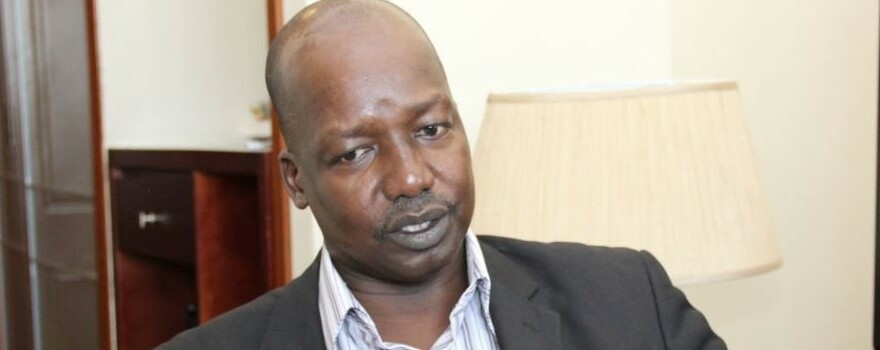Gen. Thomas Cirillo, a prominent figure in South Sudan’s opposition, voices reservations about the ongoing peace talks in Nairobi, Kenya. Despite acknowledging Kenya’s historical support, Gen. Cirillo expresses concerns about the negotiation process and the choice of venue.
In part one of an exclusive interview with Radio Tamazuj, Gen. Cirillo, the leader of the opposition National Salvation Front (NAS), elaborates on these reservations and advocates for inclusive dialogue to address the root causes of the conflict in South Sudan.
Below are edited excerpts:
Question: Gen. Thomas Cirilllo, what are your thoughts on the Kenyan mediation and the ongoing talks in Nairobi?
Answer: Firstly, I want to recognize Kenya’s significant role as a friendly neighbours to South Sudan. We deeply respect Kenya’s historical support during our struggle for independence and its contributions to the peace process, notably during the negotiations leading to the Comprehensive Peace Agreement in 2005.
Kenya has also provided refuge to many South Sudanese over the years. As for the current mediation led by President William Ruto, we were surprised by the lack of consultation with us or officials from Saint Egidio, despite their involvement in previous peace efforts.
Despite this surprise, we have chosen to embrace the Kenyan mediation in the pursuit of peace for South Sudan. However, we have expressed our preference for coordination between Kenya and Saint Egidio, given the latter’s significant role in previous peace initiatives.
While we have no objections to Kenyan mediation, we do have reservations about the choice of Nairobi as the negotiation venue.
Q: We have seen representatives from St. Egidio at the opening remarks of the Nairobi talks. Why do you still have doubts about the venue?
A: Our reservation is not about doubting the Kenyan mediation itself, but rather the process surrounding it. The main issue is that the agenda for the talks was decided without consulting us. The Kenyan mediation aims to find new mechanisms for implementing the R-ARCSS, a deal signed between the government and SPLM-IO led by Riek Machar in 2018. However, we have consistently refused to be part of this agreement, which we view as unjust and inadequate in addressing the root causes of South Sudan’s problems.
During the speeches in Nairobi on the 9th, the focus was on implementing the R-ARCSS, despite our exclusion from the agreement. If the aim is to find new mechanisms for implementation, all signatories should be involved, which includes us. This lack of inclusion is one of our concerns with the Kenyan mediation.
During our pre-negotiation meeting in Rome, we raised two points with the Kenyan delegation sent by President William Ruto. Firstly, we proposed expanding the negotiation team to include members of St. Egidio, given their significant role in previous peace efforts. Secondly, we advocated for Rome to remain the venue for peace talks due to its neutrality and security. Despite Kenya’s positive contributions to South Sudan, concerns remain about Kenyan security, which has arrested and handed over opposition members to the South Sudanese government.
In Juba, some of our opposition members have been killed or detained by President Kiir’s security agents. The heavy presence of these security forces in Kenya has created a climate of fear among South Sudanese citizens, making Nairobi unsuitable for negotiations. We want our people to feel free to express their aspirations, as they did during the Naivasha peace talks in 2005. Kenya is not conducive to this due to the fear our citizens live in, which is why we advocate for keeping peace talks in Rome, where conditions are more conducive.
Q: Some government officials are framing the Kenya talks as a continuation of the Rome peace talks. What’s your perspective on this?
A: I view this as a political statement. From our standpoint, President Salva Kiir’s leadership and the Kenyan mediation team aim to explore new methods for implementing the 2018 agreement. During our recent talks in Rome with the Juba government, we proposed delving into the root causes of the conflict in South Sudan. We advocated for a roundtable discussion involving diverse stakeholders such as political parties, civil society, religious leaders, youth, academics, and women to address the underlying issues plaguing the country.
Q: With some of your opposition colleagues joining the Nairobi talks while you remain in opposition, do you intend to persist with your position in the bush?
A: I am not alone in opposing the government; I have the support of many South Sudanese citizens. Across the country, there is a strong desire for change in leadership. NAS and SSOMA aren’t the only opposition groups challenging the government. The situation in South Sudan is dire, with escalating deaths, destruction, and widespread corruption. Ethnic divisions are being exacerbated by divisive policies. Given this grim reality, it’s clear that both the government and opposition are ill-equipped to address the magnitude of the crisis.
South Sudan belongs to all its citizens, not just the government or opposition. That’s why we advocate for an inclusive roundtable dialogue where all segments of society can come together to discuss the country’s future. If the term “roundtable conference” is contentious, we are open to alternative names as long as inclusivity remains a core principle. Until basic rights are respected in South Sudan and its people are free to shape their destiny, our struggle will continue.
Q: Are there alternative approaches besides a roundtable discussion to persuade the government and others to pursue peace in South Sudan?
A: We will persist in our struggle alongside all South Sudanese people to compel the Salva Kiir government to honour their demand for freedom and equality. Our goal is to empower South Sudanese to determine the country’s future through peaceful means.




